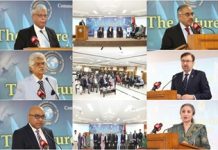The General, in a moment of personal agony over losing his job, must have given a thought to how history and Pakistanis remember other military rulers. If his objective was to create ‘true democracy’, it should not have taken him eight years, and needing another five
The return of Benazir Bhutto is one of the most important events in the recent political history of Pakistan. Not so much for the massive crowd that greeted her in Karachi but for the kind of politics her presence in the country is likely to influence. One may not agree with the declaratory motive of the Bhutto-Musharraf deal, that it is about facilitating political transition from military to civilian rule. But whatever name it is given, it is going to herald a very different politics than we have seen during the past eight years.
Even if the understanding between Bhutto and President General Pervez Musharraf on a future political arrangement, and a common stance on vital national political issues like the war on terror, may not immediately lead to a complete transition to democracy, it has the latent potential to move the country in that direction. Let me explain how we are going to witness a major change in Pakistani politics with Bhutto being a dominant player in the political arena.
The first important sign of change is the revival of the Pakistan People’s Party that has retained a solid vote bank across the country. Even the controversial political conduct in and out of office and the many failings of its leaders have not undermined the popular image that it is a party of the downtrodden, poor and the marginalised. Nor have the oppressive and divisive policies of several regimes caused any serious disintegration of the PPP support base that many political pundits and opponents of the party have been predicting for decades. It seems the great memory and legacy of its founder, Zulfikar Ali Bhutto, lives on in the hearts and minds of its supporters. Neither the generational change in the population nor the capture of the party leadership by the feudal class has tarnished the image and identity of the party.
With the PPP ready to mobilise its constituency through mass rallies and street shows, other political parties would not like to default and would, by political necessity, try to do the same. It remains to be seen whether or not political parties and their leaders would be intimidated by the threats of suicide bombings and avoid big rallies. Even a cautious approach to organising public meetings may not end old style politicking through public gatherings.
After eight years of controlled and commanded politics, Pakistan’s political parties are going to reactivate social groups that have supported them. And with elections a few months away, they will have to leave the comfort of their drawing rooms and try to reach the ordinary voter. It is the usual stuff of politics, but the difference this time around is that they would not confine themselves to local or non-issues, but debate and formulate their planks on national issues. Among the national issues, one cannot escape two central themes: civil-military relations and the war on terror.
The cumulative effect of the lawyers’ movement has considerably weakened Musharraf’s hold on power. The understanding he has with Bhutto may give him only temporary relief, and how long he enjoys her confidence or support will largely be the function of a messy and increasingly complex political scene. Political events may turn this so-called ‘marriage of convenience’ into a troubled relationship, for the PPP is a permanent fixture of the political system, while the General, having lost command of politics and the institution that he has used as his cover, may become a liability and, therefore, expendable.
Another factor that might undo Musharraf’s command politics is an expected re-return of Nawaz Sharif. How long can a regime violate laws and rulings of the superior courts to keep a popular leader out of the country, primarily to create a favourable political environment for its allies? If the law and the constitution are reduced to nothing, there may be no limit. But the perception that the law and the constitution are nothing in the face of command politics is changing. The reversal of the General’s attitude towards the PPP out of compulsion, not any political or ideological affinity, is evidence of this change.
Pakistan’s politics will move a notch toward normalcy when Sharif re-enters the country. His return will inject fresh energy into the political scene and open political space for every one. Otherwise, politics in Pakistan will be regarded as a one-sided affair, and even Bhutto’s possible contributions to democratic transition may be diminished as Sharif’s exclusion will smack of intrigue.
Musharraf’s manipulation of institutions, the fragmentation of political space and the resultant social polarisation are no longer sustainable for the good of the country. All our state and political institutions are suffering from visibly tremendous fatigue. Command politics, using a Marxian axiom, carries the seeds of its own destruction in unnatural ways of governance. The General, in a moment of personal agony over losing his job, must have given a thought to how history and Pakistanis remember other military rulers. If his objective was to create ‘true democracy’, it should not have taken him eight years, and needing another five.
In light of other nations’ political journeys, it is true that democracy and democratic culture are shaped by social and political forces, and not by individuals, particularly those in uniform. We have yet to see any evidence to this effect.
Pakistan has the necessary political heritage, institutions although they are emaciated and disfigured, and popular emotion for participatory politics. The elitist mind-set has denied the translation of popular sentiment into democratic politics. Pakistanis have a right to question the supposed merits of command politics and the political manoeuvring that comes with it. The alternative of conciliation politics inclusive and participatory with popular sovereignty as its foundational ideology- has not been tried. This line has been repeatedly rejected in Pakistan as being ‘idealistic’, which it is not. Perhaps it is the only approach that leads to stability, transparency and good politics.
The author is a professor of Political Science at the Lahore University of Management Sciences.












